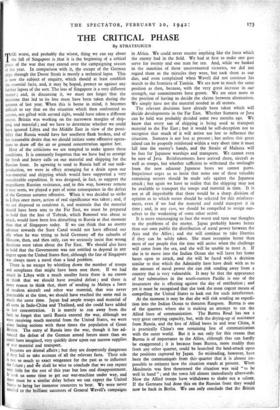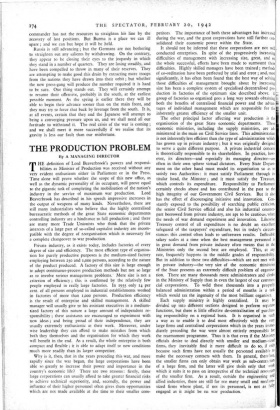THE CRITICAL PHASE
By STRATEGICUS
THE worst, and probably the wisest, thing we can say about the fall of Singapore is that it is the beginning of a critical phase of the war that may extend over the campaigning season of the year. In comparison with it, the escape of the German ships through the Dover Strait is merely a technical lapse. This is now the subject of enquiry, which should at least establish the essential facts, and, it may be hoped, protect us against any further lapses of the sort. The loss of Singapore is a very different matter; and, in discussing it, we must not forget that the decisions that led to its hiss must have been taken during the autumn of last year. When this is borne in mind, it becomes difficult to say that on the situation which then confronted us anyone, not gifted with second sight, would have taken a different course. Britain was working on the narrowest margins of ship- ping and material ; and we have to determine whether we could have ignored Libya and the Middle East in view of the possi- bility that Russia would have her southern flank broken, and of her reasonable desire that we should initiate some offensive opera- tions to draw off the air or ground concentration against her.
Most of the criticisms we are tempted to make ignore these conditions. It is constantly forgotten that we have had to arrange for fresh and heavy calls on our material and shipping for the Russian front. In agreeing to send to Russia half of our tank- production, we were in effect arranging for a drain upon our ar-material and shipping which would have supported a very considerable expedition. It was designed, in fact, to support the magnificent Russian resistance, and in this way, however remote it may seem, we played a part of some consequence in the defeat of the German autumn offensive. When it was decided to strike in Libya once more, action of real significance was taken ; and, if we are disposed to condemn it, and maintain that the material should have been sent to the Far East, we must be prepared to hold that the loss of Tobruk, which Rommel was about to attack, would have been less disturbing to Russia at that moment than that of Singapore today. If we can think that an enemy advance towards the Suez Canal would not have affected our ally when he was trying to hold Germany off the suburbs of Moscow, then, and then only, can we seriously insist that wrong decisions were taken about the Far East. We should also have to hold that the Government was not entitled to depend in any degree upon the United States fleet, although the fate of Singapore was always more a naval than a land problem.
There is no escape by whittling down the number of troops and aeroplanes that might have been sent there. If we had struck in Libya with a much smaller force there is no reason to think that we should have avoided defeat ; and there is every reason to think that, short of sending to Malaya a force of modem aircraft and other war material, that was never practicable at the time, we should have reached the same end in much the same time. Japan had ample troops and material of all sorts in Indo-China and Thailand, and she could have added to her concentration. It is merely to run away from the facts to forget that until Russia entered the war, although we were receiving much material from the United States, we were alone facing nations with three times the population of Great Britain. The entry of Russia into the war, though it has ad- vanced the defeat of the German armed forces more than we could have imagined, very quickly drew upon our narrow supplies of war material and transport.
Inquests are dismal affairs ; but they are desperately dangerous if they fail to take account of all the relevant facts. Their role Is not so much to exact vengeance for the past as to influence the future ; and We shall be wise to conclude that we can expect very little for the rest of this year but loss and disappointment. It took us some time to get our war-machine under way, and there must be a similar delay before we can expect the United States to bring her immense resources to bear. We were never entitled to the brilliant successes of General Wavell's campaigns
in Africa. We could never muster anything like the force which the enemy had in the field. We had at first to make one gun serve for twenty and one man for ten. And, while we basked in the sunshine of these uncovenanted victories, we did not regard them as the miracles they were, but took them as our due, and even complained when Wavell did not continue his march to the frontiers of Tunisia. We are now in much the same position as then, because, with the very great increase in our strength, our commitments have grown. We are once more in the position of having to decide the claims between alternatives. We simply have not the material needed in all sectors.
The relevant decisions have already been taken which will decide developments in the Far East. Whether Sumatra or Java can be held was probably decided some two months ago. We know that every ton of shipping is being used to transport material to the Far East ; but it would be self-deception not to recognise that much of it will arrive too late to influence the situation. Sumatra is not lost at present ; but unless this great island can be properly reinforced within a very short time it must fall into the enemy's hands, and the Straits of Malacca will be free for Japanese warships and transports. We cannot even be sure of Java. Reinforcements have arrived there, aircraft as well as troops, but whether sufficient to withstand the onslaught from the now adjacent Japanese bases we cannot guess. Impatience urges us to insist that some one of these valuable remaining sectors should be made safe against the Japanese attack ; but again we have to realise that the shipping may not be available to transport the troops and material in time. It is not at all improbable that there would be a sharp division of opinion as to which sector should be selected for this reinforce- ment, even if we had the material and could transport it in time ; and, in any case, we should be compelled to resign our- selves to the weakening of some other sector.
It is more encouraging to face the worst and turn our thoughts to the problems of the enemy. Japan probably knows better than our own public the distribution of naval power between the Axis and the Allies ; and she will continue to take liberties if they can be safely taken. She must recognise better than most of our people that the time will arrive when the challenge will come from the sea, and she will be unable to meet it. If she is to move into the Indian Ocean she will leave her home bases open to attack, and she will be faced with a decision similar to that which the Admiralty here have dealt with as to the amount of naval power she can risk sending away from a country that is very vulnerable. It may be that the appearance of her submarines in the south-eastern Pacific is one of the insurances she is effecting against the day of retribution ; and yet it must be recognised that she took the most cogent means of compelling the United States to look out for such interference.
At the moment it may be that she will risk sending an expedi- tion into the Indian Ocean to threaten Rangoon. Burma is one of the quarters where she is making an attempt to cut the Allied lines of communication. The Burma Road has not a very great carrying capacity, but, with the drying-up of assistance from Russia, and the loss of Allied bases in and near China, it is practically China's one remaining line of communication with the outer world. But it is not only for this reason that Burma is of importance to the Allies, although that can hardly be exaggerated ; it is because from Burma, more readily than from any other quarter, could be launched the land-attack upon the positions captured by Japan. So misleading, however, have been the communiqués from this quarterthat it is almost im- possible to estimate how the situation stands at present. When Moulmein was first threatened the situation was said " to be well in hand " ; and the town fell almost immediately afterwards. Now the Allied troops have withdrawn to shake out a salient. If the Germans had done this on the Russian front they would now be back in Berlin. We can only conclude that the British commander has not the resources to straighten his line by the recovery of lost positions. But Burma is a place we can ill spare ; and we can but hope it will be held.
Russia is still advancing ;, but the Germans are not bothering to straighten out any salients by withdrawing. On the contrary, they appear to be closing their eyes to the jeopardy in which they stand in a number of quarters. They are losing steadily, and have been compelled to throw in many of their reserves. They are attempting to make good this drain by extracting more troops from the nations they have drawn into their orbit ; but whether the new press-gang will produce the number required it is hard to be sure. One thing stands out. They will certainly attempt to resume their offensive, probably in the south, at the earliest possible moment. As the spring is earlier there they will be able to begin their advance sooner than on the main front, and they may try to force that back by leverage from the south. It is, at all events, certain that they and the Japanese will attempt to bring a converging pressure upon us, and we shall need all our fortitude to withstand it. The real crisis of the war is coming ; and we shall meet it more successfully if we realise that its gravity is less our fault than our misfortune.



























 Previous page
Previous page